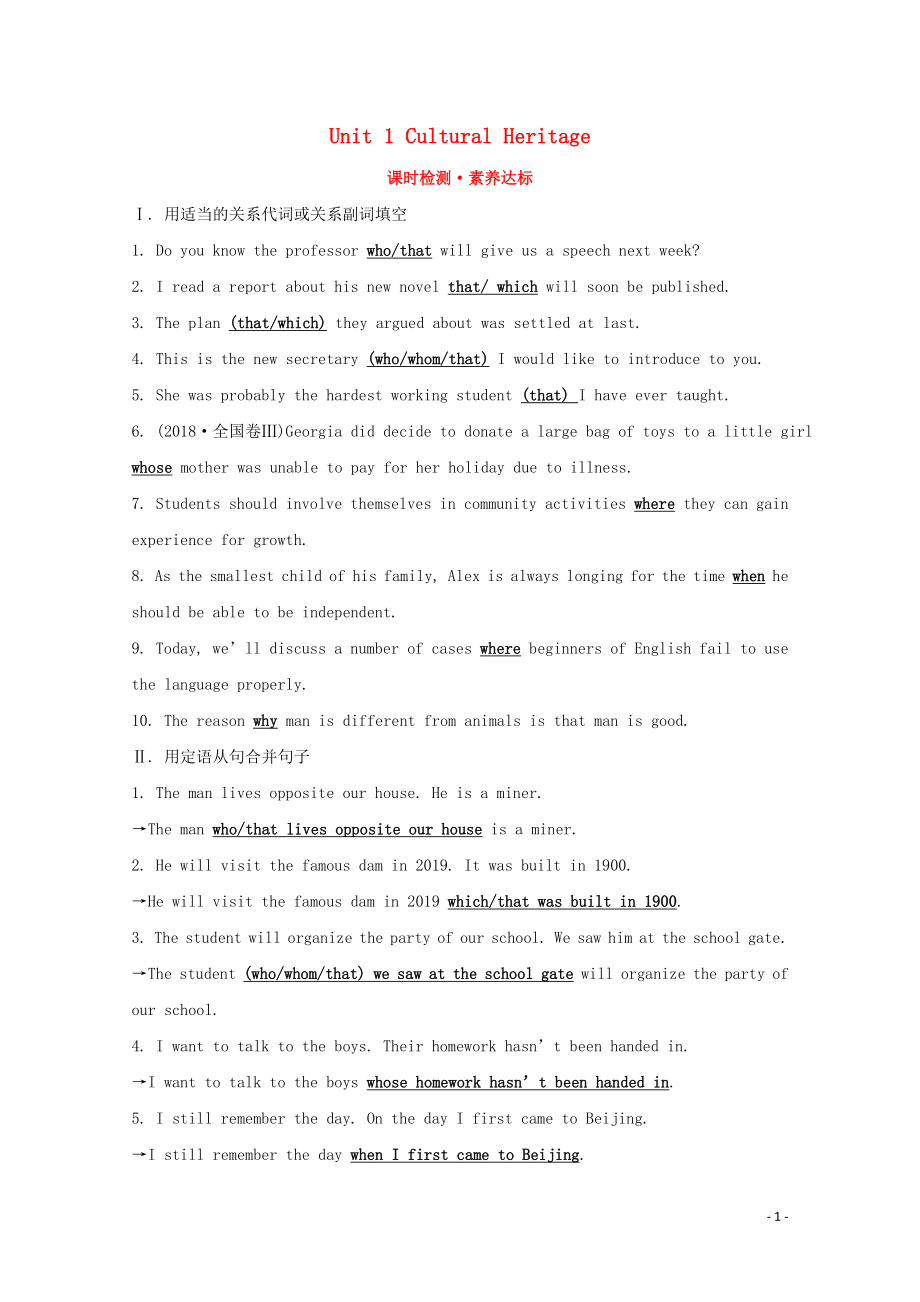《2020版新教材高中英語 Unit 1 Cultural Heritage Discovering Useful Structures課時檢測素養(yǎng)達標(biāo) 新人教版必修2》由會員分享,可在線閱讀���,更多相關(guān)《2020版新教材高中英語 Unit 1 Cultural Heritage Discovering Useful Structures課時檢測素養(yǎng)達標(biāo) 新人教版必修2(3頁珍藏版)》請在裝配圖網(wǎng)上搜索���。
1、Unit 1 Cultural Heritage
課時檢測·素養(yǎng)達標(biāo)
Ⅰ. 用適當(dāng)?shù)年P(guān)系代詞或關(guān)系副詞填空
1. Do you know the professor who/that will give us a speech next week?
2. I read a report about his new novel that/ which will soon be published. ?
3. The plan (that/which) they argued about was settled at last.
4. This is the new secreta
2���、ry (who/whom/that) I would like to introduce to you.
5. She was probably the hardest working student (that) I have ever taught. ?
6. (2018·全國卷Ⅲ)Georgia did decide to donate a large bag of toys to a little girl whose mother was unable to pay for her holiday due to illness.
7. Students should inv
3���、olve themselves in community activities where they can gain experience for growth.
8. As the smallest child of his family, Alex is always longing for the time when he should be able to be independent.
9. Today, we’ll discuss a number of cases where beginners of English fail to use the language p
4、roperly.
10. The reason why man is different from animals is that man is good.
Ⅱ. 用定語從句合并句子
1. The man lives opposite our house. He is a miner.
→The man who/that lives opposite our house is a miner. ?
2. He will visit the famous dam in 2019. It was built in 1900.
→He will visit the famous
5���、dam in 2019 which/that was built in 1900. ?
3. The student will organize the party of our school. We saw him at the school gate.
→The student (who/whom/that) we saw at the school gate will organize the party of our school. ?
4. I want to talk to the boys. Their homework hasn’t been handed in.
6���、→I want to talk to the boys whose homework hasn’t been handed in. ?
5. I still remember the day. On the day I first came to Beijing.
→I still remember the day when I first came to Beijing. ?
6. The chemist often does experiments in the lab. The lab is not far from here.
→The lab where the chem
7、ist often does experiments is not far from here. ?
7. He grew up in the small town. After graduation, he returned to the small town.
→After graduation, he returned to the small town where he grew up. ?
8. You’re focused on the reason. You’re doing it in the first place for the reason.
→You’re
8���、focused on the reason why you’re doing it in the first place. ?
9. Many things are done on computers these days. We live in the days.
→We live in the days when many things are done on computers. ?
用本單元的語法點(限制性定語從句)翻譯下面句子, 并組成一段連貫的短文���。
1. 建在山頂上的寺廟可追溯到(date back to) 600年前。(which)
2. 它是一所需要好好保
9���、護(preserve)的最著名文化遺跡之一���。(which)
3. 這所寺廟所在的山也因它而出名���。(where)
4. 古人在這里建造它的原因還不清楚。(why)
5. 但是, 人們依然高度贊揚創(chuàng)造性地建造它的古人們���。(who/that)
6. 目前, 由當(dāng)?shù)匚幕糠纸?established)的委員會正在努力防止它遭到破壞���。(which/that)
The temple which was built on a high mount dates back to 600 years ago. It is one of the most famous cultural relics
10、 which should be preserved well. The mount where the temple stands is also famous for it. The reason why ancient people built here isn’t clear. People still think highly of the people who built it creatively. The committee which was established by the cultural department is trying to prevent it from being destroyed. ?
- 3 -
 2020版新教材高中英語 Unit 1 Cultural Heritage Discovering Useful Structures課時檢測素養(yǎng)達標(biāo) 新人教版必修2
2020版新教材高中英語 Unit 1 Cultural Heritage Discovering Useful Structures課時檢測素養(yǎng)達標(biāo) 新人教版必修2

